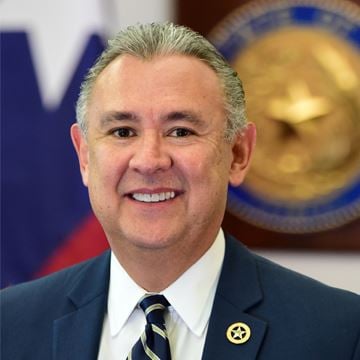By JENNIFER McDERMOTT
CORTINA D’AMPEZZO, Italy (AP) — Team USA skiers Lindsey Vonn and Mikaela Shiffrin, along with Italy’s Federica Brignone, are among the many skiers who have expressed concern during these Olympic Games about the accelerating melt of the world’s glaciers.
And Olympic host city Cortina is a fitting place for them to be talking about climate change: Glaciers once visible from town have dramatically shrunk. Many have been reduced to tiny glaciers or residual ice patches at high elevations among the jagged peaks of the Dolomites. Any Olympian or spectator wishing to lay eyes on a major glacier would have to take a long drive on winding mountain roads to the Marmolada. It’s melting rapidly, too.
The world’s top skiers train on glaciers because of the high-quality snow there, and a warming world jeopardizes the future of their sport. Vonn started skiing on glaciers in Austria when she was just 9 years old.
“Most of the glaciers that I used to ski on are pretty much gone,” 41-year-old Vonn said Feb. 3 in response to a question from The Associated Press at a prerace press conference in Cortina before she crashed on the Olympic downhill course. “So that’s very real and it’s very apparent to us.”
As athletes in snow sports, Shiffrin said, they “get a real front-row view” to the monumental changes underway atop some of the world’s highest, coldest peaks.
“It is something that’s very close to our heart, because it is the heart and soul of what we do,” Shiffrin told AP after racing Sunday. “I would really, really like to believe and hope that with strong voices and sort of broader policy changes within companies and governments, there is a hope for a future of our sport. But I think right now, it’s a little bit of a … it’s a question.”
A view of the Cristallo mountain group is pictured in the Dolomites, which was once home to glaciers, seen from Olympic host city Cortina d’Ampezzo, Italy, Feb. 7, 2026 (AP Photo/ Jennifer McDermott)
Italy’s glaciers are disappearing
Italian glaciologist Antonella Senese said Italy has lost more than 200 square kilometers (77 square miles) of glacier area since the late 1950s.
“We are observing a continuous and uninterrupted decrease in glacier area and volume. In the last one to two decades, this reduction has clearly accelerated,” Senese, associate professor of physical geography in the University of Milan’s environmental science and policy department, said in an interview.
Among the peaks surrounding Cortina d’Ampezzo, there are glaciers on the slopes of the Cristallo and Sorapiss mountains. The 2015 New Italian Glacier Inventory found these glaciers shrunk by about one-third since the 1959-1962 inventory.
Shortly after winning a second gold Sunday at her home Winter Olympics, Brignone told AP that skiing is “totally different” now than when she was younger. Brignone lives in the Valle d’Aosta, about six hours away.
When she sees how glaciers are retreating to higher elevations, Brignone said she’s not thinking about the future of skiing — she’s concerned for the future of the planet.
“There we have a lot of glaciers, but they are going up and up, every year, more and more,” she told AP.
Yet many people who don’t frequent the mountains remain unaware of what’s at stake, so the University of Innsbruck created the Goodbye Glaciers Project. The loss of glaciers has far-reaching consequences, threatening water sources, increasing mountain hazards and contributing to sea level rise.
The project shows how different warming levels change the amount of ice left on selected glaciers around the world. To be included, glaciers must have an estimated 2020 volume of at least 0.01 cubic kilometers. The Cristallo and Sorapiss glaciers no longer meet that threshold, said Patrick Schmitt, a doctoral student at the University of Innsbruck.
A view of the Cristallo mountain group is pictured in the Dolomites, which was once home to glaciers, seen from Olympic host city Cortina d’Ampezzo, Italy, Feb. 7, 2026 (AP Photo/ Jennifer McDermott)
Preserving glaciers
Some 50 kilometers (31 miles) from Cortina is the Marmolada glacier, one of the largest glaciers in Italy and the largest in the Dolomites. An apartment building-sized chunk of the glacier detached in July 2022, sparking an avalanche of debris that killed 11 hikers. The mountain is popular for hiking in summer and skiing in winter.
The University of Padua said in 2023 the glacier had been halved over 25 years.
It’s expected to be mostly gone by 2034 if the world warms 2.7 Celsius (4.9 Fahrenheit), according to the Goodbye Glaciers Project. But if warming is limited to 1.5 C (2.7 F — the international goal — the glacier’s life could be extended by another six years, and around 100 glaciers in the Alps can be saved, Schmitt said.
“Cutting greenhouse gas emissions now will reduce future ice loss and soften the impacts on people and nature,” Schmitt wrote in an email. “The choices we make in this decade will decide how much ice remains in the Dolomites, across the Alps, and around the world.”
Globally, more than 7 trillion tons of ice (6.5 trillion metric tons) has been lost since 2000, according to a study last year. And the prospective impact of climate change on Olympic sport is enormous; the list of places that could host Winter Games is projected to shrink substantially in the coming years.
It’s not just Vonn, Shiffrin and Brignone — many Olympic skiers are concerned
In Cortina, Noa Szollos, who is competing for Israel, said in an interview the state of the nearby glaciers speaks to the condition of glaciers around the world.
“I hope we can do something about it,” she said, “but it’s a hard time.”
Related Articles
At the Olympics and beyond, women’s sports media outlets are writing their own playbooks
Quirky curling has turned into a betting magnet at the Milan Cortina Olympics
Brazilian snowboarder Pat Burgener’s Olympic journey spans the mountains to music
US hockey’s Hilary Knight and speedskater Brittany Bowe post video of their engagement at Olympics
US star Mikaela Shiffrin becomes 3-time Olympic champion with dominant slalom win
Silja Koskinen of Finland said in an interview she can’t train on some of the glaciers she used to because of crevices, rocks and flowing water. Team USA skier AJ Hurt talked about starting the season in October on glaciers in Sölden, Austria.
“Every year, I feel like we come and there’s a little less snow. And every time, we’re like, are we really going to start in October? There’s no snow here,’” Hurt told the AP. “It is really sad and it’s hard to ignore in this sport, definitely, when we’re around it so much and it is so clear.”
Norwegian skier Nikolai Schirmer is leading an effort to stop fossil fuel companies from sponsoring winter sports. Burning coal, oil and gas is the largest contributor to global climate change by far.
In Bormio, Italy, Team USA skier River Radamus said athletes — as stewards of outdoor winter sports— should be on the forefront of trying to defend the environment as best they can.
“It’s always present in our mind that we’re on a dangerous trend unless we do something right,” Radamus said.
AP Sports Writer Pat Graham contributed from Bormio, Italy.
AP Winter Olympics coverage: https://apnews.com/hub/milan-cortina-2026-winter-olympics
The Associated Press’ climate and environmental coverage receives financial support from multiple private foundations. AP is solely responsible for all content. Find AP’s standards for working with philanthropies, a list of supporters and funded coverage areas at AP.org.




